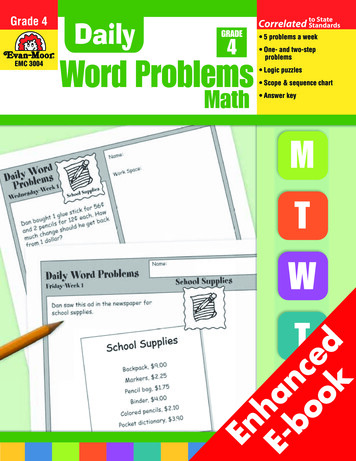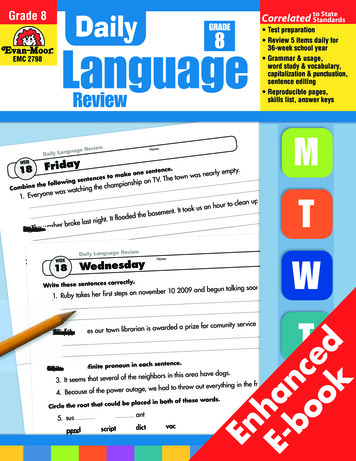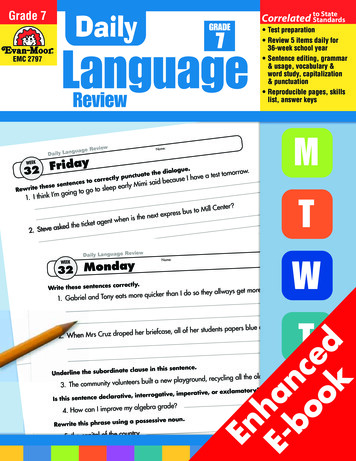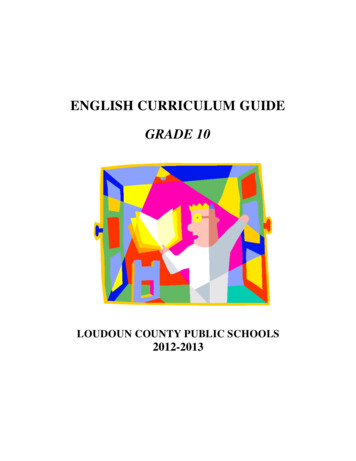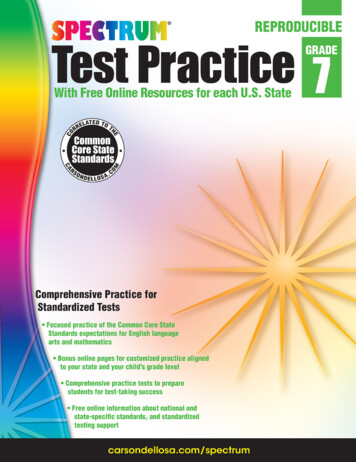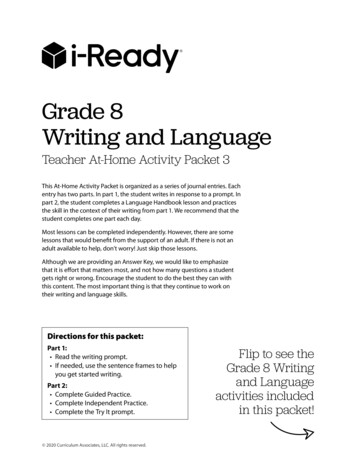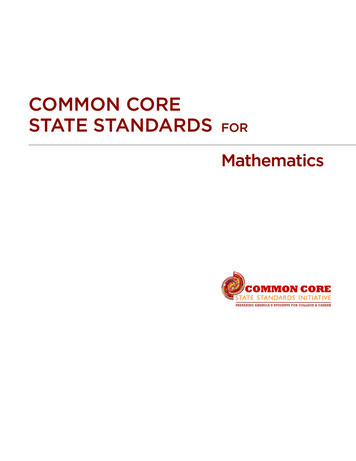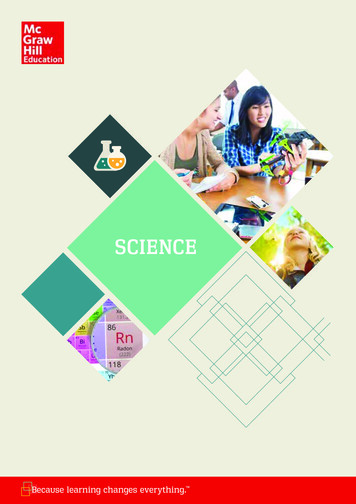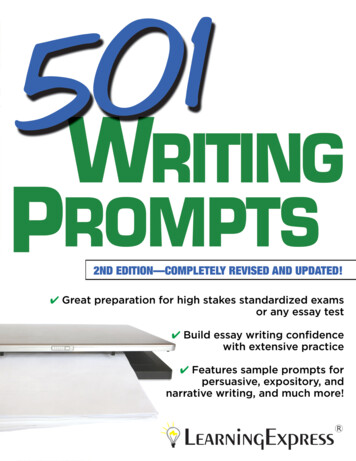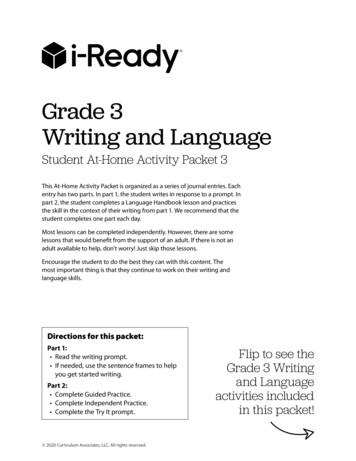
Transcription
Grade 3Writing and LanguageStudent At-Home Activity Packet 3This At-Home Activity Packet is organized as a series of journal entries. Eachentry has two parts. In part 1, the student writes in response to a prompt. Inpart 2, the student completes a Language Handbook lesson and practicesthe skill in the context of their writing from part 1. We recommend that thestudent completes one part each day.Most lessons can be completed independently. However, there are somelessons that would benefit from the support of an adult. If there is not anadult available to help, don’t worry! Just skip those lessons.Encourage the student to do the best they can with this content. Themost important thing is that they continue to work on their writing andlanguage skills.Directions for this packet:Part 1: Read the writing prompt. If needed, use the sentence frames to helpyou get started writing.Part 2: Complete Guided Practice. Complete Independent Practice. Complete the Try It prompt. 2020 Curriculum Associates, LLC. All rights reserved.Flip to see theGrade 3 Writingand Languageactivities includedin this packet!
Table of ContentsGrade 3 Writing and Language ActivitiesEntry1Writing PromptPart 1ResourcePage7Part 2Language Handbook, Grade 3Lesson 5AdverbsJournal Entry 1PART 1Lesson 5#This week, your family has assigned different household chores to everyone. Yourchore is to do the laundry. Something goes madly wrong. Write what happens.X.#.#:Lesson TitleAdverbsIntroductionAn adverb is a word that tells something about a verb, or action.Many adverbs end in -ly and tell how or in what way. When you write, you can use adverbsto help your readers picture clearly what is happening.The batter quickly ran to first base.The umpire watched the runner closely. The adverb quickly describes the verb ran. It tells how the batter ran. The adverb closely describes the verb watch. It tells in what way the umpire watched.Guided PracticeHINT An adverbcan come eitherbefore or after theverb it describes. Asentence mightsay walked slowly, orit might sayslowly walked.Underline the adverb in each sentence. Draw an arrow from theadverb to the verb that it tells about.1 Jasmine nervously stood at home plate.2 Her family shouted her name loudly.3 She carefully rested the bat against her shoulder.4 The pitcher gripped the ball tightly and then threw it.5 Jasmine hit the ball sharply, and it soared toward left field.6 A player tried to catch the ball but accidentally dropped it.7 Jasmine easily slid into home base.When I did thelaundry 2020 Curriculum Associates, LLC. All rights reserved.28 Her whole team cheered wildly!7Grade 3 Packet 3, Entry 1Part 1406Language Handbook Lesson 5 Adverbs Curriculum Associates, LLCCopying is not permitted.10Part 2Language Handbook, Grade 3Lesson 18Punctuating AddressesJournal Entry 2PART 1Lesson #18You have new neighbors. Help them learn the area. Make a list of your favoriteplaces to visit. Write down the address of each place. Don’t forget to includeimportant places like your school. Use the Internet to find the addresses if youdon’t know them.X.#.#:Lesson Title AddressesPunctuatingIntroductionWhat is the name of the street where your school is? What city or townis it in? What is the name of the state where you live? When you put all of this informationtogether, you get an address.When you write an address, place a comma (,) between the name of the street and the city.Place another comma between the name of the city and the state.The store is at 300 Craig Street, Durham, North Carolina.Guided PracticeHINT The name ofa street can also havethe word Road,Drive, Lane, orAvenue at the end.The comma alwayscomes after thosewords.Rewrite each address. Add commas where they are needed.Then finish the last sentence by writing your own address.1 18 West Lane Orlando Florida2 2 Griggs Avenue Albany New York3 531 Front Street Monroe Wisconsin4 1538 Oakwood Drive Canton Ohio5 49 Jeffrey Road Athens GeorgiaMy favorite places intown are 2020 Curriculum Associates, LLC. All rights reserved.Grade 3 Packet 3, Entry 16 My address is10432Language Handbook Lesson 18 Punctuating Addresses Curriculum Associates, LLCCopying is not permitted. 2020 Curriculum Associates, LLC. All rights reserved.Grade 3 Packet 32
Table of ContentsGrade 3 Writing and Language Activities (Cont.)Entry3Writing PromptPart 1ResourcePage13Part 2Language Handbook, Grade 3Lesson 11Subject-Verb AgreementJournal Entry 3PART 1Lesson #11Your gym teacher posts workouts for you on Facebook. Write a post to yourteacher to convince him to have a water fight as part of a workout. Be sure toinclude ways that you and the other students will be responsible while doing this.X.#.#:Lesson Title AgreementSubject–VerbIntroduction The subject of a sentence tells whom or what the sentence is about.A subject can tell about one or more than one person, place, or thing. The verb in thesentence must agree with, or match in number, the subject. The subject can be singular orplural.SingularPluralsubject verbsubjectKenji writes poems for a hobby.verbHis brothers write songs.Follow these rules if the subject is a singular noun or the pronoun he, she, or it.Add -s to the end of most verbs.Tara collects old trains.Add -es if the verb ends in ch, sh, ss, or x. She washes the trains.Change y to i before adding -es if theverb ends in a consonant and y.She tries to fix them.Do not add anything to the verb if the subject is a plural noun or the pronoun I, you, we,or they.Sometimes I help Tara, too. The trains always look beautiful.Guided PracticeHINT If a verbends in a vowel andy, just add -s if thesubject is singular. Donot add anything ifthe subject is plural.A water fight wouldbe a good workoutbecause Example:Tina plays sports.We play, too. 2020 Curriculum Associates, LLC. All rights reserved.4Grade 3 Packet 3, Entry 313Part 1418Cross out each verb that does not agree with its subject. Write theverb correctly above it.Many people enjoys hobbies. My friend Simon likes baseballcards. He keep them in a huge box. My sister Kim watch cartoons.Then she draws her favorite characters. My grandparents travela lot. They saves coins from everywhere. Even our dog finds bonesand bury them in our yard.Language Handbook Lesson 11 Subject–Verb Agreement Curriculum Associates, LLCCopying is not permitted.16Part 2Language Handbook, Grade 3Lesson 14Coordinating ConjunctionsJournal Entry 4PART 1Lesson #14You get to redecorate a room in your home. Which room will you choose? Howwill you choose to redecorate it? Write to describe it to others.X.#.#:Lesson Title ConjunctionsCoordinatingIntroduction A conjunction is a word that is used to join other words, groups ofwords, or sentences. The words and, but, or, and so are conjunctions. Use and when you mean “also.”Birds and dogs are my favorite animals. Use but when you want to show a difference.Mario’s cat is playful, but Lila’s cat likes to sleep. Use or when you want to show a choice.Dad says we can have a kitten or a puppy. Use so when you want to give a reason.I love animals, so I like having a lot of pets.Guided PracticeHINT Sometimesmore than oneconjunction canmake sense in asentence. Choose theconjunctionthat makes themeaning clearest.Write the conjunction and, but, or, or so to complete each sentence.1 Poodlescollies are both smart dogs.2 I take my dog to the park,3 Shanti likes catshe can get more exercise.not dogs.4 Pedro wants a dog,5 Kim walks her doghe does not want a big dog.then feeds him.6 Should we name the puppy Ernie7 Our dog doesn’t obey,Bert?we need to send him to adog trainer.I am redecorating 8 Pedro might get a dog today,he will wait untiltomorrow. 2020 Curriculum Associates, LLC. All rights reserved.Grade 3 Packet 3, Entry 116424Language Handbook Lesson 14 Coordinating Conjunctions Curriculum Associates, LLCCopying is not permitted. 2020 Curriculum Associates, LLC. All rights reserved.Grade 3 Packet 33
Table of ContentsGrade 3 Writing and Language Activities (Cont.)Entry5Writing PromptPart 1ResourcePage19Part 2Language Handbook, Grade 3Lesson 8Simple Verb TensesJournal Entry 5PART 1Lesson 8#You had a strange dream last night. You were on a different planet. Write a storyabout what it might be like to live on that planet in the future.X.#.#:Lesson VerbSimpleTitle TensesIntroductionThe tense of a verb helps readers know when something is happening. The present tense shows that something is happening now, or in the present.I walk on the grass. The past tense shows that something happened before, or in the past. To form thepast tense of most verbs, add -ed at the end.In 1969, Neil Armstrong walked on the moon. The future tense shows what is going to happen in the future. To form the futuretense, put will before the verb.Maybe someday we will walk on Mars.Look at the table below. Notice how the verbs change when the tense changes.Present TensePast TenseFuture TenseGuided Practicelooklookedwill lookroamroamedwill roamdiscoverdiscoveredwill discoverWrite the correct tense of the verb to complete each sentence.1 The NASA space programHINT Words andphrases such asin 1958, today, andyears from now canhelp you decidewhich verb tenseto use.in 1958.start2 In 1961, NASAa capsule called Freedom 7.launch3 John GlennEarth in 1962.orbitIn the future, itwould be 4 Today, astronautson a space station.stay5 Years from now, we willto other planets.travel 2020 Curriculum Associates, LLC. All rights reserved.619Grade 3 Packet 3, Entry 1Part 1412Language Handbook Lesson 8 Simple Verb Tenses Curriculum Associates, LLCCopying is not permitted.22Part 2Language Handbook, Grade 3Lesson 16Subordinating Conjunctions and Complex SentencesJournal Entry 6PART 1Lesson #16You’re a reporter for your school newspaper. Everyone is back in school. Writea newspaper article about what happened to close your school. Tell what yourteachers and classmates will do now that school is open again.SubordinatingLessonTitle Conjunctionsand Complex SentencesIntroductionX.#.#:Simple sentences can be combined using different kindsof conjunctions. One way to combine simple sentences is to use a conjunction such as after, because,when, or while. When you combine two simple sentences with such conjunctions,you form a complex sentence.simple sentencesimple sentence[Yasmin did not stay for the game] although [she loves soccer.] In a complex sentence, the conjunction shows how the ideas in the two simplesentences go together. The conjunction can come at the beginning or in the middle of the sentence.ConjunctionsWhen to UseExamplesbecauseto explain or give a reason Yasmin went home because she felt ill.She had a snack before she took aafter, before,to show when thingsnap.until, when,happenwhileWhen she woke up, she watched TV.although,to compare or to showShe’ll stay home Monday unless sheunlessan exceptionfeels better.Guided PracticeOur school has been closed Now that everyone is back 2020 Curriculum Associates, LLC. All rights reserved.Grade 3 Packet 3, Entry 1HINT When youbegin a sentence witha conjunction, use acomma after the firstsimple sentence.1 The soccer players have fun. They practice. (while)2 Kayla works hard. She wants to be a better player. (because)Example:Before you playsoccer, youshould stretch.22Combine each pair of simple sentences to make a complexsentence. Use the conjunction in parentheses ( ).4283 Milo was on the team. He got hurt. (until)Language Handbook Lesson 16 Subordinating Conjunctions and Complex Sentences Curriculum Associates, LLCCopying is not permitted. 2020 Curriculum Associates, LLC. All rights reserved.Grade 3 Packet 34
Table of ContentsGrade 3 Writing and Language Activities (Cont.)Entry7Writing PromptPart 1ResourcePage25Part 2Language Handbook, Grade 3Lesson 19Punctuating DialogueJournal Entry 7PART 1Lesson #19You need ideas for the classroom play. You overheard two classmates tellingabout a fun trip they went on together. Write what they said as the opening actfor your class play.X.#.#:Lesson Title DialoguePunctuatingIntroduction When characters in a story talk to each other, this is a dialogue. Whenyou write a dialogue, use quotation marks (“ ”) before and after each speaker’s words.Mr. Simons said, “We’re going on a field trip!”“Hooray!” the class shouted.When a speaker’s words come last in a sentence, use a comma (,) to separate the speaker’swords from the rest of the sentence.Myra asked, “Where are we going?”Mr. Simons answered, “We are going to the Natural History Museum.”Guided PracticeRead each sentence. Then rewrite the sentence on the line below,adding quotation marks and commas where needed.1 I am so excited about our trip to the museum! Janie said.HINT The endpunctuation after aspeaker’s wordsshould be inside thequotation marks.2 Carlos asked Do you think it will be boring?Correct: “It’s a dog,isn’t it?”Incorrect: “It’s a dog,isn’t it”?3 Then Justin explained It’s a chance to go someplace new.“We had so muchfun when we wentto ,” said 2020 Curriculum Associates, LLC. All rights reserved.8Grade 3 Packet 3, Entry 14 I think we’ll have a great time! Tanisha added.25Part 1434Language Handbook Lesson 19 Punctuating Dialogue Curriculum Associates, LLCCopying is not permitted.28Part 2Language Handbook, Grade 3Lesson 24Choosing Words and Phrases for EffectJournal Entry 8PART 1Lesson 24#You wake up to find you have a superpower. Write to tell about this newsuperpower. What can you do? How will you use your superpower?X.#.#:ChoosingLessonTitleWords andPhrases for EffectIntroduction When writing, pick words and phrases that express your ideas andexperiences in a lively, interesting way. Replace general words or phrases with more precise words or phrases.On SaturdayLast week I went to a nice swimming party. Swap general verbs with more specific or descriptive verbs.attendedOn Saturday I went to a nice swimming party. Trade in weak adjectives for stronger or more interesting adjectives.an amazingOn Saturday I attended a nice swimming party. The final sentence is much more precise and interesting to read than the first one.On Saturday I attended an amazing swimming party.Guided PracticeHINT Whenreplacing a word orphrase, make sureyou are changing theeffect of thesentence but not itsmeaning.When I woke up thismorning, I discovered Circle the word or phrase that can best take the place of theunderlined word or phrase. The goal is to make each sentencemore precise and interesting.1 The swimming party started in the afternoon.at noonGrade 3 Packet 3, Entry 128Everyone at the party was very glad to swim.rosemovedreadyblazedsurprisedexcited4The pool was a depth of 12 feet.5I walked to the edge and slowly got into the pool.measured444earlyWhen I arrived, the sun was over the pool.3went 2020 Curriculum Associates, LLC. All rights reserved.later on2seemedjumpedLanguage Handbook Lesson 24 Choosing Words and Phrases for Effecthadeased Curriculum Associates, LLCCopying is not permitted. 2020 Curriculum Associates, LLC. All rights reserved.Grade 3 Packet 35
Table of ContentsGrade 3 Writing and Language Activities (Cont.)Entry9Writing PromptPart 1ResourcePage31Part 2Language Handbook, Grade 3Lesson 22Adding SuffixesJournal Entry 9PART 1Lesson #22The sun is shining, and you get to do whatever you want to do as long as you doit outside. Write to tell how you will spend this nice day.X.#.#:Lesson TitleAddingSuffixesIntroduction A suffix is a word part added to the end of a base word. Adding asuffix changes the meaning of a word.base wordwalk suffixing walkingFollow these spelling rules when adding suffixes to base words.When a Suffix Begins with a VowelIf the base word ends in a short vowel soundand one consonant, double the consonant.bat t ing battingjog g ed joggedIf the base word ends in a silent -e, drop the e.smile – e ing smilingsafe – e er saferWhen a Base Word Ends with a Consonant and yChange the y to i before adding most suffixes.Guided PracticeHINT When youadd -ing to a verbthat ends in y, do notchange the y to i.Example:try 1 ing 5 tryingfly 1 ing 5 flyinghappy – y i ness happinesssilly – y i est silliestAdd the suffix shown to each word. Write the new word.1 hike ed2 skip ing3 nice er4 hurry ing5 silly ness6 try edI will spend the day 7 dive ing8 funny est 2020 Curriculum Associates, LLC. All rights reserved.10Grade 3 Packet 3, Entry 131Part 1440Language Handbook Lesson 22 Adding Suffixes Curriculum Associates, LLCCopying is not permitted.34Part 2Language Handbook, Grade 3Lesson 25Spoken and Written EnglishJournal Entry 10PART 1Lesson 25#Write about a topic you know a lot about. You can write about anything.Lesson TitleSpokenand Written EnglishX.#.#:Introduction When you speak with friends, you don’t have to worry about everyword and how it sounds. But when you write, you want your words to be exact and clear. When you speak, you often use single words and phrases. When you write, youshould use complete sentences.Spoken EnglishDan: Want to see the stars tonight?Ava: Nah. Too many clouds. Maybetomorrow.Written EnglishClear nights are the best time tosee stars. When you speak, you often use slang such as hey or can’t. When you write, you usuallydo not use slang or contractions.Spoken EnglishDan: That’s a shooting star.Ava: Hey, there’s another one. Whoa!There are so many I can’t countthem all!Guided PracticeHINT To findspoken language,look for slang such asyup and awesome.Also, look forsentences that arenot complete.Written EnglishDuring the meteor shower, more than150 shooting stars came streaking acrossthe sky.Read each sentence with a partner. Which ones sound like spokenlanguage? Write spoken or written next to each sentence. Tell yourpartner which clues helped you decide.1 This is okay homework.2 Yup, really good.3 Learning about meteors is interesting.4 The next meteor shower will be in August.5 Awesome. Can’t wait!I know a lot about 6 The number of shooting stars people see depends on wherethey stand. 2020 Curriculum Associates, LLC. All rights reserved.Grade 3 Packet 3, Entry 134446Language Handbook Lesson 25 Spoken and Written English Curriculum Associates, LLCCopying is not permitted. 2020 Curriculum Associates, LLC. All rights reserved.Grade 3 Packet 36
Journal Entry 1PART 1This week, your family has assigned different household chores to everyone. Yourchore is to do the laundry. Something goes madly wrong. Write what happens.When I did thelaundry 2020 Curriculum Associates, LLC. All rights reserved.Grade 3 Packet 3, Entry 17
PART 2Lesson 5#X.#.#:Lesson TitleAdverbsIntroductionAn adverb is a word that tells something about a verb, or action.Many adverbs end in -ly and tell how or in what way. When you write, you can use adverbsto help your readers picture clearly what is happening.The batter quickly ran to first base.The umpire watched the runner closely. The adverb quickly describes the verb ran. It tells how the batter ran. The adverb closely describes the verb watch. It tells in what way the umpire watched.Guided PracticeHINT An adverbcan come eitherbefore or after theverb it describes. Asentence mightsay walked slowly, orit might sayslowly walked.Underline the adverb in each sentence. Draw an arrow from theadverb to the verb that it tells about.1 Jasmine nervously stood at home plate.2 Her family shouted her name loudly.3 She carefully rested the bat against her shoulder.4 The pitcher gripped the ball tightly and then threw it.5 Jasmine hit the ball sharply, and it soared toward left field.6 A player tried to catch the ball but accidentally dropped it.7 Jasmine easily slid into home base.8 Her whole team cheered wildly!406Language HandbookLesson5 Adverbs 2020CurriculumAssociates, LLC. All rights reserved. Curriculum Associates,GradeLLC Copyingis 3,notEntrypermitted.3 Packet18
PART 2Independent PracticeFor numbers 4 and 5, choose the word thatthe underlined adverb describes.1 The crowd clapped excitedly when4 Jasmine smiled shyly when she sawJasmine hit the home run.her DhitDfamily5 She quickly jogged back to the benchthe ball perfectly.and sat satKnowledgeKnowledge ofof LanguageLanguage2 The coach told Jasmine that she had hitConventions of Standard EnglishFor numbers 1–3, choose the word in thesentence that is an adverb.3 Jasmine’s brother waved proudly andjumped from his seat.wavedBproudlyCjumpedDseat Curriculum Associates, LLCCopyingis not permitted. 2020CurriculumAssociates, LLC. All rights reserved.Vocabulary Acquisition and UseATry ItReread what you wrote in Part 1.Find several places where you can betterdescribe the action using adverbs. Addthose to your story.Language Handbook5 3,AdverbsGrade 3Lesson PacketEntry 14079
Journal Entry 2PART 1You have new neighbors. Help them learn the area. Make a list of your favoriteplaces to visit. Write down the address of each place. Don’t forget to includeimportant places like your school. Use the Internet to find the addresses if youdon’t know them.My favorite places intown are 2020 Curriculum Associates, LLC. All rights reserved.Grade 3 Packet 3, Entry 210
PART 2Lesson #18X.#.#:Lesson Title AddressesPunctuatingIntroductionWhat is the name of the street where your school is? What city or townis it in? What is the name of the state where you live? When you put all of this informationtogether, you get an address.When you write an address, place a comma (,) between the name of the street and the city.Place another comma between the name of the city and the state.The store is at 300 Craig Street, Durham, North Carolina.Guided PracticeHINT The name ofa street can also havethe word Road,Drive, Lane, orAvenue at the end.The comma alwayscomes after thosewords.Rewrite each address. Add commas where they are needed.Then finish the last sentence by writing your own address.1 18 West Lane Orlando Florida2 2 Griggs Avenue Albany New York3 531 Front Street Monroe Wisconsin4 1538 Oakwood Drive Canton Ohio5 49 Jeffrey Road Athens Georgia6 My address is432Language HandbookLesson18 PunctuatingAddresses 2020CurriculumAssociates,LLC. All rights reserved. Curriculum Associates,GradeLLC Copyingis 3,notEntrypermitted.3 Packet211
PART 2Independent PracticeConventions of Standard EnglishFor numbers 1–3, pick the choice that correctly punctuates the address underlined inthe sentence.1 My grandmother lives at 945 Peters Street Fresno California.A945 Peters, Street Fresno, CaliforniaB945 Peters Street, Fresno, CaliforniaC945 Peters Street Fresno, CaliforniaD945 Peters Street, Fresno California2 I sent the card to 310 Medford Road Concord North Carolina.310 Medford Road, Concord, North CarolinaB310, Medford Road, Concord, North CarolinaC310 Medford Road, Concord North, CarolinaD310 Medford Road Concord, North CarolinaKnowledgeKnowledge ofof LanguageLanguageA3 The address on the envelope was 18 Arcola Lane Tucson Arizona.18 Arcola, Lane, Tucson, ArizonaB18 Arcola Lane, Tucson ArizonaC18 Arcola Lane, Tucson, ArizonaD18 Arcola Lane Tucson, ArizonaVocabulary Acquisition and UseAIt familyLook atmovedyour listtoof4placesandthe addresses.Edit your4 TryHiro’sCharlesDriveBristol RhodeIsland.addresses to make sure you have commas in the right places.A your4 CharlesDrive Bristol,RhodeIslandmember.Sharelist of favoriteplaces witha familyB4 Charles Drive, Bristol Rhode IslandC4, Charles Drive, Bristol, Rhode IslandD4 Charles Drive, Bristol, Rhode Island Curriculum Associates, LLCCopyingis not Associates,permitted. LLC. All rights reserved. 2020CurriculumLanguage Handbook Lesson 18PunctuatingGrade3 PacketAddresses3, Entry 243312
Journal Entry 3PART 1Your gym teacher posts workouts for you on Facebook. Write a post to yourteacher to convince him to have a water fight as part of a workout. Be sure toinclude ways that you and the other students will be responsible while doing this.A water fight wouldbe a good workoutbecause 2020 Curriculum Associates, LLC. All rights reserved.Grade 3 Packet 3, Entry 313
PART 2Lesson #11X.#.#:Lesson Title AgreementSubject–VerbIntroductionThe subject of a sentence tells whom or what the sentence is about.A subject can tell about one or more than one person, place, or thing. The verb in thesentence must agree with, or match in number, the subject. The subject can be singular orplural.SingularPluralsubject verbsubjectKenji writes poems for a hobby.verbHis brothers write songs.Follow these rules if the subject is a singular noun or the pronoun he, she, or it.Add -s to the end of most verbs.Tara collects old trains.Add -es if the verb ends in ch, sh, ss, or x. She washes the trains.Change y to i before adding -es if theverb ends in a consonant and y.She tries to fix them.Do not add anything to the verb if the subject is a plural noun or the pronoun I, you, we,or they.Sometimes I help Tara, too. The trains always look beautiful.Guided PracticeMany people enjoys hobbies. My friend Simon likes baseballHINT If a verbends in a vowel andy, just add -s if thesubject is singular. Donot add anything ifthe subject is plural.Example:Tina plays sports.We play, too.418Cross out each verb that does not agree with its subject. Write theverb correctly above it.cards. He keep them in a huge box. My sister Kim watch cartoons.Then she draws her favorite characters. My grandparents travela lot. They saves coins from everywhere. Even our dog finds bonesand bury them in our yard.Language Handbook Lesson 11 Subject–Verb Agreement 2020 Curriculum Associates, LLC. All rights reserved. Curriculum Associates, LLCCopying is not permitted.Grade 3 Packet 3, Entry 314
PART 2Independent PracticeConventions of Standard EnglishFor numbers 1–5, read each sentence. Then choose the correct verb to agree with the subject.1 My uncleAfishsBfishiesCfishesDfish2 Hefor a DlikeAsearchsBsearchesCsearchDsearchse5 DoraAknowsBknowesCknowzDknowthe names of many rocks.KnowledgeKnowledge ofof LanguageLanguageAAfor interesting flowersand rocks.the fish home in a pail.3 My sisters4 Theyto hike.Vocabulary Acquisition and UseTry ItReread what you wrote in Part 1. Look for times when subjects and verbsdon’t agree. Fix any places where this happens. Curriculum Associates, LLCCopyingis not Associates,permitted. LLC. All rights reserved.2020CurriculumLanguage Handbook Lesson 11GradeSubject–VerbAgreement3 Packet3, Entry 341915
Journal Entry 4PART 1You get to redecorate a room in your home. Which room will you choose? Howwill you choose to redecorate it? Write to describe it to others.I am redecorating 2020 Curriculum Associates, LLC. All rights reserved.Grade 3 Packet 3, Entry 416
PART 2Lesson #14X.#.#:Lesson Title ConjunctionsCoordinatingIntroductionA conjunction is a word that is used to join other words, groups ofwords, or sentences. The words and, but, or, and so are conjunctions. Use and when you mean “also.”Birds and dogs are my favorite animals. Use but when you want to show a difference.Mario’s cat is playful, but Lila’s cat likes to sleep. Use or when you want to show a choice.Dad says we can have a kitten or a puppy. Use so when you want to give a reason.I love animals, so I like having a lot of pets.Guided PracticeWrite the conjunction and, but, or, or so to complete each sentence.HINT Sometimes1 Poodlesmore than oneconjunction canmake sense in asentence. Choose theconjunctionthat makes themeaning clearest.2 I take my dog to the park,collies are both smart dogs.3 Shanti likes catshe can get more exercise.not dogs.4 Pedro wants a dog,5 Kim walks her doghe does not want a big dog.then feeds him.6 Should we name the puppy Ernie7 Our dog doesn’t obey,Bert?we need to send him to adog trainer.8 Pedro might get a dog today,he will wait untiltomorrow.424Language HandbookLesson14 CoordinatingConjunctions 2020CurriculumAssociates,LLC. All rights reserved. Curriculum Associates,GradeLLC Copyingis 3,notEntrypermitted.3 Packet417
PART 2Independent PracticeConventions of Standard EnglishFor numbers 1–5, choose the best conjunction to complete each sentence.1 Parrots are colorfulAandBbutCorDsosmart birds.2 Most parrots live in jungles,no petat all.AandBbutCorDso5 I would like to have both a parrota ledge ofof LanguageLanguagesome of them live inhomes as pets.4 Anisa wants a parrot3 Parrots have strong, curved beaks,they can crack open seeds.andBbutCorDso Curriculum Associates, LLCCopyingis not permitted. 2020CurriculumAssociates, LLC. All rights reserved.Try ItReread your Part 1 writing.Find sentences that you might combine.Revise those sentences using the correctconjunctions.Language Handbook Lesson 14 CoordinatingConjunctionsGrade 3 Packet3, Entry 4Vocabulary Acquisition and UseA42518
Journal Entry 5PART 1You had a strange dream last night. You were on a different planet. Write a storyabout what it might be like to live on that planet in the future.In the future, itwould be 2020 Curriculum Associates, LLC. All rights reserved.Grade 3 Packet 3, Entry 519
PART 2Lesson 8#X.#.#:Lesson VerbSimpleTitle TensesIntroductionThe tense of a verb helps readers know when something is happening. The present tense shows that something is happening now, or in the present.I walk on the grass. The past tense shows that something happened before, or in the past. To form thepast tense of most verbs, add -ed at the end.In 1969, Neil Armstrong walked on the moon. The future tense shows what is going to happen in the future. To form the futuretense, put will before the verb.Maybe someday we will walk on Mars.Look at the table below. Notice how the verbs change when the tense changes.Present TensePast TenseFuture TenseGuided PracticeHINT Words andphrases such asin 1958, today, andyears from now canhelp you decidewhich verb tenseto use.looklookedwill lookroamroamedwill roamdisc
2020 urricuum ssociates rigts reserve. Grade 3 Packet 3 Grade 3 Writing and Language Activities Cont.) Entry Writing Prompt Resource Page 5 Part 1 Part 2 Language Handbook, Grade 3 Lesson 8 Simple Verb Tenses 19 2020 urricuum ssociates rigts reserve. Grade 3 Packet 3 Entry 1 You had a
